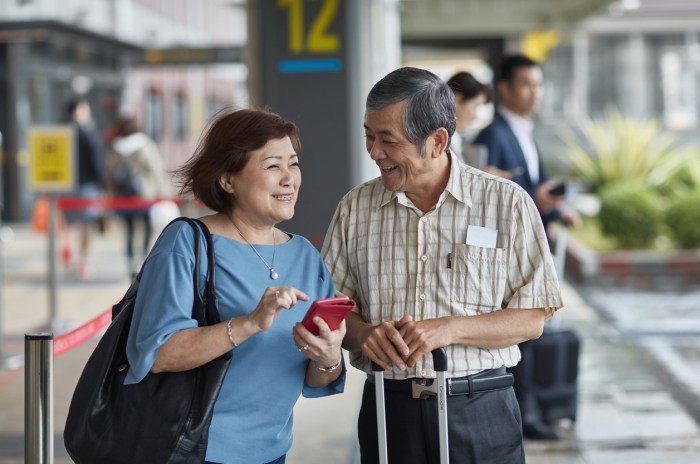Senior Travel Service is experiencing explosive growth, driven by an aging global population with increased disposable income and a desire for enriching travel experiences. This burgeoning market presents significant opportunities for businesses catering to the unique needs and preferences of older travelers, demanding innovative solutions and tailored services. Understanding the demographics, motivations, and concerns of this segment is crucial for success in this competitive landscape.
This report delves into the intricacies of the senior travel market, analyzing its current state, future projections, and the challenges and opportunities faced by service providers. We examine successful business models, marketing strategies, and the technological advancements shaping the future of senior travel, ultimately offering insights for businesses seeking to thrive in this rapidly evolving sector.
Market Analysis: Senior Travel Service

The senior travel market represents a significant and rapidly growing segment within the broader tourism industry. Characterized by discerning travelers with specific needs and preferences, it presents both challenges and lucrative opportunities for service providers. Understanding the demographics, motivations, and concerns of this demographic is crucial for developing effective and profitable strategies.
Senior Travel Market Demographics
The senior travel market encompasses a broad age range, generally considered to be individuals aged 55 and above, although the specific definition can vary depending on the service provider and the type of travel offered. High-net-worth individuals within this age group represent a particularly lucrative segment, possessing both the disposable income and the desire for premium travel experiences. Income levels vary significantly within this demographic, ranging from fixed incomes to substantial retirement savings.
Travel preferences are equally diverse, encompassing everything from budget-friendly domestic trips to luxury international adventures. Cruises, escorted tours, and all-inclusive resorts are particularly popular options, reflecting a desire for convenience and ease of travel.
Motivations and Concerns of Senior Travelers
Senior travelers are motivated by a range of factors, including the desire to explore new cultures, reconnect with loved ones, and pursue personal interests. Many seek opportunities for relaxation and rejuvenation, while others are driven by a desire to learn and expand their horizons. However, several key concerns often influence their travel decisions. These include accessibility, health and safety considerations, and the need for clear and readily available information.
Concerns about physical limitations, potential health emergencies, and the complexities of navigating unfamiliar environments are also paramount. The desire for ease and convenience in travel arrangements is a major factor influencing choice.
Comparison with Other Travel Segments
Compared to other travel segments, the senior travel market exhibits distinct characteristics. Unlike the budget-conscious backpacking segment, senior travelers often prioritize comfort, convenience, and personalized service. Unlike family travel, which often focuses on child-friendly accommodations and activities, senior travel emphasizes relaxation, cultural immersion, and opportunities for social interaction. Business travel, with its emphasis on efficiency and productivity, stands in stark contrast to the leisure-oriented focus of senior travel.
The senior market often values curated experiences and personalized itineraries, whereas other segments may prioritize independent exploration.
Current Trends and Future Projections
Several trends are shaping the future of the senior travel market. The increasing longevity and improved health of the senior population are driving significant growth. The rise of experiential travel, with a focus on unique and enriching experiences, is also attracting senior travelers. Technological advancements, such as user-friendly booking platforms and accessible travel apps, are improving the travel experience.
The growing demand for accessible and inclusive travel options caters to the diverse needs of this demographic. Market projections suggest continued strong growth in the senior travel sector, driven by demographic shifts and evolving travel preferences. For example, the AARP projects a significant increase in the number of travelers aged 50 and over in the coming decades.
Senior Travel Service Provider Comparison
| Provider | Price Range | Offerings | Target Audience |
|---|---|---|---|
| Globus | Mid-range to Luxury | Guided tours, cruises, escorted journeys | Active seniors seeking structured itineraries |
| Tauck | Luxury | Small group tours, premium accommodations, exclusive experiences | Affluent seniors seeking high-end travel |
| Road Scholar (formerly Elderhostel) | Mid-range | Educational travel programs, learning-focused itineraries | Seniors interested in cultural and educational experiences |
| Viking River Cruises | Luxury | River cruises, all-inclusive packages | Seniors seeking comfortable and relaxing river cruises |
Challenges and Opportunities

The senior travel market, while experiencing robust growth, presents unique challenges and opportunities for service providers. Successfully navigating this sector requires a keen understanding of the evolving needs and expectations of older travelers, coupled with a proactive approach to risk management and technological innovation. Failure to adapt to these dynamics can lead to lost market share in a rapidly expanding and increasingly competitive landscape.
Health Concerns and Safety Management, Senior Travel Service
Managing the health concerns of senior travelers is paramount. This necessitates meticulous trip planning, including readily available medical assistance options, pre-trip health assessments, and accessible travel arrangements. Safety, too, is a critical consideration. Providers must implement robust security protocols, including vetted transportation partners, safe accommodation choices, and readily available emergency contact information. For example, a provider might partner with a telehealth service to offer 24/7 medical consultation to travelers, or arrange for travel insurance policies specifically designed for senior citizens.
Failure to adequately address these concerns can lead to negative reviews and reputational damage.
Innovation and Growth Opportunities in Senior Travel
The senior travel market offers significant opportunities for innovation. This includes developing specialized travel itineraries catering to specific interests and physical abilities, such as adventure tours tailored for active seniors or culturally immersive experiences designed for those seeking intellectual stimulation. Furthermore, there’s potential for growth in niche markets, such as multi-generational travel packages or cruises specifically designed for seniors.
Consider the success of companies specializing in accessible travel; they have capitalized on the growing demand for travel experiences that cater to diverse physical needs and abilities.
Technology’s Role in Enhancing Senior Travel Experiences
Technology plays a crucial role in enhancing senior travel experiences. User-friendly mobile applications can provide real-time travel information, emergency assistance, and translation services. Digital platforms can facilitate seamless booking processes, offer personalized recommendations, and provide access to relevant health information. For example, an app could provide location-based services, notifying users of nearby pharmacies or medical facilities, or offering real-time translation capabilities to overcome language barriers.
This demonstrates how technology can enhance safety and convenience for senior travelers.
Regulatory Environment for Senior Travel Services
The regulatory landscape for senior travel services varies significantly across countries. Some nations have stringent regulations concerning health and safety standards, while others have a more laissez-faire approach. Understanding these differences is crucial for providers operating internationally. Compliance with local regulations, including licensing requirements and consumer protection laws, is essential to avoid legal issues and maintain a positive reputation.
For instance, the European Union has comprehensive regulations regarding passenger rights and accessibility in travel, while the regulations in some Asian countries may be less detailed.
Differentiation Strategies for Senior Travel Services
Differentiation is key to success in the competitive senior travel market. Providers can differentiate themselves through specialized services, such as curated itineraries focusing on specific interests (e.g., historical tours, culinary experiences), personalized travel planning, and exceptional customer service. Building strong relationships with local providers and incorporating sustainable and responsible travel practices can also enhance a company’s appeal.
For example, a company might offer bespoke travel itineraries focusing on wellness activities, partnering with local spas and wellness centers to create a unique and holistic travel experience. This strategy targets a segment of the senior travel market that values health and well-being.
The senior travel market is dynamic and ripe for innovation. By understanding the specific needs and preferences of this demographic, leveraging technology to enhance experiences, and employing effective marketing strategies, businesses can capitalize on the significant opportunities presented. The future of senior travel is marked by personalized experiences, accessible services, and a focus on enriching the lives of older travelers, promising continued growth and exciting possibilities for those who cater to this discerning market.

